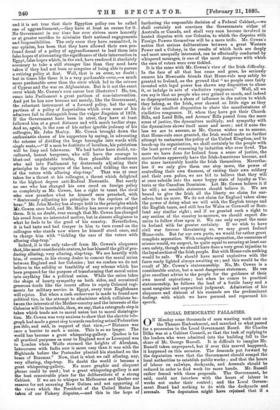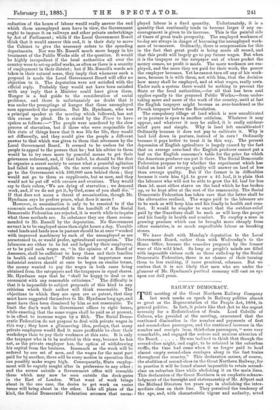SOCIAL DEMOCRATIC FALLACIES.
ON Monday some thousands of men wanting work met on the Thames Embankment, and marched in what passed for a procession to the Local Government Board. Sir Charles Dike was at a Cabinet Council, so that the task of replying to the leaders who were admitted into the building fell to the share of Mr. George Russell. It is difficult to imagine Mr. Russell taken unprepared, but if ever this marvel happened, it happened on this occasion. The demands put forward by the deputation were that the Government should compel the local authorities to establish public works ; and that the hours of labour on railviays, dockyards, and Arsenals should be reduced in order to find work for more hands. Mr. Russell rather fenced with these proposals. The Government, he said, could not interfere with the hours of labour in works not under their control ; and the Local Government Board had nothing to do with the dockyards and arsenals. The deputation might have rejoined that if a
reduction of the hours of labour would really answer the end which these unemployed men have in view, the Government ought to impose it on railways and other private undertakings by Act of Parliament ; while if the Local Government Board think that it would answer this end, it is their duty to move the Cabinet to give the necessary orders to the spending departments. Nor was Mr. Russell much more happy in his treatment of the Public Works side of the question. It would be highly inexpedient if the local authorities all over the country were to set-up relief works, as often as there is a scarcity of employment in their district; but if Mr. Russell's words are taken in their natural sense, they imply that whenever such a proposal is made the Local Government Board will offer no objection to it. The deputation were not satisfied with the official reply. Probably they would not have been satisfied with any reply that a Minister could have given them. Hunger is a bad guide to the consideration of social problems, and there is unfortunately no doubt that it was under the promptings of hunger that those unemployed men approached the question. But Mr. Hyndman, who was a principal speaker at the meeting which followed, has not this excuse to plead. He is stated by the Times to have spoken as follows :—" The people were murdered by the slow process of starvation, but if those who were responsible for this state of things knew that it was life for life, they would act differently, and they would give the people a different anstver to that which was given to them that afternoon by the Local Government Board. It seemed to be useless for the people to appeal to the powers that be ; but his advice to them would be to try once more by peaceful means to get their grievances redressed, and, if that failed, he should be the first to organise a secret society to secure what a peaceful agitation had failed to accomplish. On the next occasion they would go to the Government with 100,000 men behind them ; they would not go to them as supplicants, but as men, and they would not be put off with excuses and evasions. They would say to their rulers, 'We are dying of starvation ; we demand work, and, if we do not get it, by God, some of you shall die.' " If that does not mean a threat of assassination, though Mr. Hyndman says he prefers peace, what does it mean
However, as assassination is only to be resorted to if the economic methods enumerated in the handbill of the Social Democratic Federation are rejected, it is worth while to inquire what these methods are. In substance they are those recommended to Mr. Russell by the deputation. No Government servant is to be employed more than eight hours a day. Uncultivated lands and lands now in pasture should be at once " worked with improved machinery by such of the unemployed as are accustomed to, or would prefer, agricultural occupation." The labourers are either to be fed and lodged by their employers, or to be paid such wages as, " in the opinion of a Board of Assessors, shall be sufficient to keep them and their families in health and comfort." Public works of importance near industrial centres should at once be begun on similar terms, the money wanted to pay the wages in both cases being obtained from the ratepayers and the taxpayers in equal shares. Mr. Hyndman says that he "shall be happy to deal as an economist with any reasonable criticisms." The difficulty is that it is impossible to subject proposals of this kind to any criticism which their author will think reasonable. The objections to which they are open are so patent, that they must have suggested themselves to Mr. Hyndman long ago, and must have then been dismissed by him as not reasonable. To limit the day's work in Government offices to eight hours, while enacting that the same wages shall be paid as at present, is in effect to increase wages by a fifth. The Social Democratic Federation do not propose to deal with private wages in this way ; they have a glimmering idea, perhaps, that many private employers would find it more profitable to close their workshops than to pay their workmen at this rate. It is only the taxpayer who is to be mulcted in this way, because he has not, as the private employer has, the option of withdrawing his capital from the business. Inasmuch as the work will be ordered by one set of men, and the wages for the most part paid for by another, there will be every motive in operation that can possibly make wages high. Consequently, State employment will be eagerly sought after in preference to any other ; and the scenes outside a Government office will resemble those which may now be seen outside the dock-gates in the East of London. What want of work brings about in the one case, the desire to get work on easier terms will bring about in the other. Like all plans of the kind, the Social Democratic Federation assumes that unem ployed labour is a fixed quantity. Unfortunately, it is a quantity that continually tends to become larger if any encouragement is given to its increase. This is the painful side of times of great trade prosperity. The employed workmen of to-day are always in danger of becoming the unemployed workmen of to-morrow. Ordinarily, there is compensation for this in the fact that great profit is being made all round, and that this profit will largely go to pay future wages. But when it is the taxpayer or the ratepayer out of whose pocket the money comes, no profit is made. The more workmen are employed, and the more they are paid for their work, the poorer the employer becomes. Yet he cannot turn off any of his workmen, because it is with them, not with him, that the decision how many shall be employed, and at what wages, really rests. Under such a system there would be nothing to prevent the State or the local authorities,—for all that has been said applies equally to the proposed Public Works,—from undertaking more and more of the work of the country, until at last the English taxpayer might become as over-burdened as the French taxpayer before the Revolution. The compulsory tillage of land which is now uncultivated or in pasture is open to another criticism. Whatever it may appear, and whatever it may be called, it is really outdoorrelief pure and simple. Why is land left uncultivated ? Ordinarily because it does not pay to cultivate it. Why is land laid down in pasture, instead of in corn ? Ordinarily because it pays better to treat it in this way. The present depression of English agriculture is largely caused by the fact that on average corn-land the English producer cannot put a loaf on the English consumer's table for the price for which the American producer can put it there. The Social Democratic Federation propose to try whether the experiment which has failed on land of average quality will answer on land of less than average quality. But if the farmer is in difficulties because it costs him 4id. to grow a 4d. loaf, it is plain that the labourer who will not be able to grow the 4d. loaf for less than 5d, must either starve on the land which he has broken up, or be kept alive at the cost of the community. The Social Democratic Federation has taken care that the latter shall be the alternative realised. The wages paid to the labourer are to be such as will keep him and his family in health and comfort. It would be simpler to enact that the outdoor-relief paid by the Guardians shall be such as will keep the pauper and his family in health and comfort. To employ a man in growing produce which can be brought more cheaply from other countries, is as much unprofitable labour as breaking stones.
We have dealt with Monday's deputation to the Local Government Board, rather than with Wednesday's to the Home Office, because the remedies proposed by the former were of this wild kind. So long as people's minds are filled with impossible visions such as those called-up by the Social Democratic Federation, there is no chance of their turning them to less exciting, if more practical, schemes. But we confess that it is not likely that men who are under the glamour of Mr. Hyndman's poetical economy will cast an eye upon our dull prose.



































 Previous page
Previous page